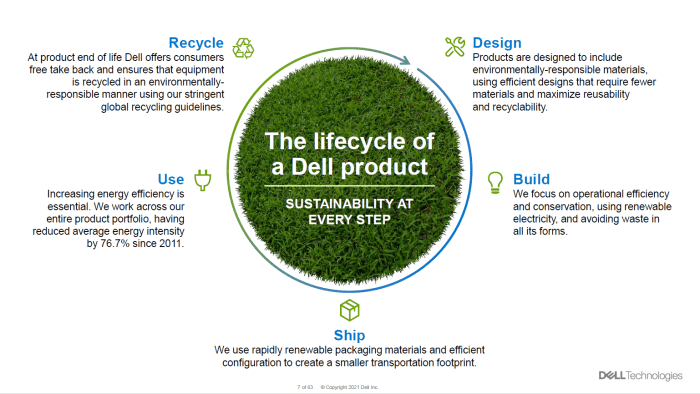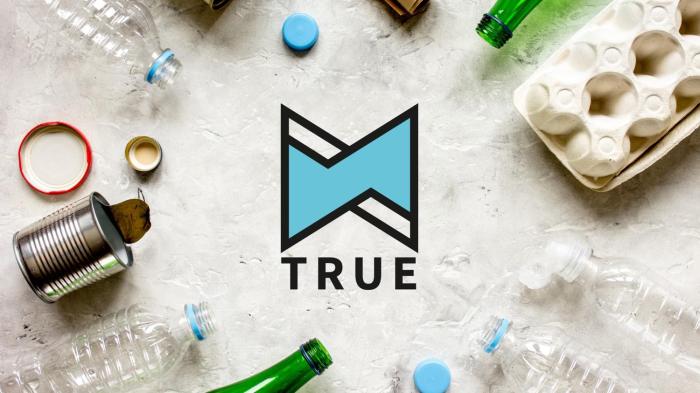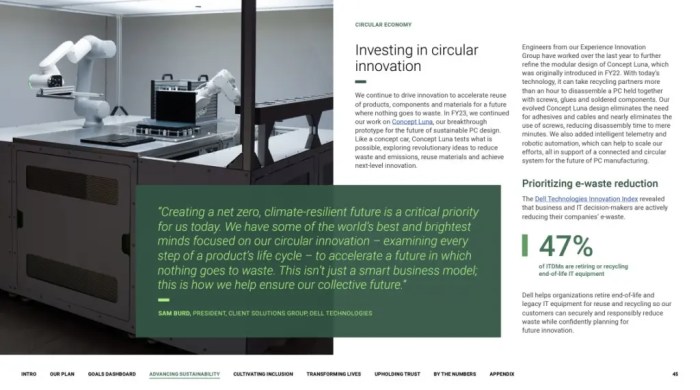Dell Sustainability A Comprehensive Overview
Dell sustainability is more than just a buzzword; it’s a fundamental aspect of Dell’s operations, encompassing environmental, social, and product-related initiatives. This exploration delves into Dell’s multifaceted approach, from its environmental goals and supply chain strategies to its social impact and product sustainability features. We’ll examine their commitment to responsible sourcing, ethical labor practices, and community investment, ultimately revealing Dell’s comprehensive sustainability vision.
Dell’s environmental initiatives extend across the entire value chain, from reducing carbon emissions and conserving water to promoting sustainable materials and waste reduction. The company’s commitment to social responsibility includes supporting diverse and inclusive workplaces, community engagement, and educational programs. Dell’s product sustainability encompasses features like recycled materials, lifecycle management, and eco-conscious design principles. We’ll analyze Dell’s performance against competitors to assess its progress and identify areas for improvement.
Dell’s Environmental Initiatives
Dell is actively pursuing environmentally responsible practices across its operations, from manufacturing to product design. This commitment extends to its entire supply chain, demonstrating a comprehensive approach to sustainability. The company is publicly setting targets and reporting on its progress, highlighting its dedication to environmental protection.
Dell’s environmental strategy encompasses a wide range of initiatives, including carbon footprint reduction, sustainable materials usage, and waste minimization. The company’s efforts demonstrate a long-term vision for environmental stewardship, aligning with global sustainability goals.
Environmental Goals and Targets
Dell has established publicly stated environmental goals and targets, aiming to reduce its environmental impact across its operations. These targets cover various aspects, such as carbon emissions, water usage, and waste generation. The goals are often set in line with industry benchmarks and global sustainability initiatives.
Strategies for Reducing Carbon Footprint
Dell employs various strategies to reduce its carbon footprint throughout its entire supply chain. These include optimizing energy efficiency in its manufacturing facilities, promoting renewable energy sources, and implementing sustainable transportation methods. Dell actively works with its suppliers to encourage similar sustainability practices. A key aspect involves the reduction of transportation emissions through optimized logistics.
Sustainable Materials and Manufacturing Processes
Dell is committed to incorporating sustainable materials in its products and manufacturing processes. This commitment extends to reducing the use of hazardous substances, promoting the use of recycled materials, and exploring innovative materials with lower environmental impacts. The company aims to minimize the environmental footprint of its products throughout their entire life cycle.
Waste Reduction and Recycling Programs
Dell has implemented comprehensive waste reduction and recycling programs. These programs encompass various aspects, including the efficient management of electronic waste, the development of closed-loop recycling systems, and the promotion of responsible disposal practices. Dell strives to minimize waste throughout its operations and actively supports the responsible recycling of its products.
Key Partnerships and Collaborations
Dell collaborates with various organizations and stakeholders to advance sustainability. These partnerships often involve shared expertise, resources, and initiatives to promote environmental protection. Dell frequently partners with NGOs and industry peers to advance sustainability practices.
Sustainable Product Design and Lifecycle Management
Dell prioritizes sustainable product design, considering the entire lifecycle of its products from initial design to end-of-life management. This encompasses minimizing material usage, optimizing product durability, and promoting easy repairability and recyclability. Dell aims to design products that are not only functional but also environmentally responsible.
Transparency in Environmental Performance Reporting
Dell maintains transparency in its environmental performance reporting, publicly disclosing its progress towards its sustainability goals. This transparency allows stakeholders to assess Dell’s commitment and progress towards environmental responsibility. The company provides detailed reports on its environmental performance, allowing for scrutiny and accountability.
Comparison of Sustainability Performance, Dell sustainability
| Metric | Dell | Competitor 1 | Competitor 2 |
|---|---|---|---|
| Carbon Emissions | (Data to be filled) | (Data to be filled) | (Data to be filled) |
| Water Usage | (Data to be filled) | (Data to be filled) | (Data to be filled) |
| Waste Generation | (Data to be filled) | (Data to be filled) | (Data to be filled) |
Note: Data in the table should be filled with specific, quantifiable figures and metrics, obtained from Dell’s sustainability reports and competitor disclosures.
Dell’s Social Impact

Source: amcham.no
Dell’s commitment to social responsibility extends beyond environmental initiatives. The company actively works to create a positive impact on communities, fostering ethical labor practices and promoting diversity, equity, and inclusion throughout its operations and supply chain. Dell recognizes that its success is intertwined with the well-being of the communities it serves and the people who work for and with it.
Ethical Labor Practices and Fair Trade
Dell upholds high standards for ethical labor practices across its global supply chain. The company actively seeks to ensure fair wages, safe working conditions, and freedom from exploitation for all workers involved in its manufacturing and supply processes. Dell’s commitment to fair trade principles involves transparent and responsible sourcing, ensuring that materials and products are obtained ethically and sustainably. This commitment extends to the entire supply chain, emphasizing responsible treatment of workers at every stage of production.
Diversity, Equity, and Inclusion
Dell actively promotes diversity, equity, and inclusion (DE&I) within its workforce and supply chain. The company recognizes the value of diverse perspectives and experiences and strives to create a workplace where all employees feel valued, respected, and empowered to contribute their best work. Dell’s efforts in DE&I are reflected in initiatives aimed at attracting and retaining a diverse talent pool and fostering an inclusive culture.
Community Investment and Philanthropy
Dell is deeply invested in the communities it serves globally. The company’s philanthropic activities and community investment programs are designed to support local initiatives and address critical needs in education, healthcare, and economic development. This includes strategic partnerships with non-profit organizations, grants, and volunteer opportunities to enhance the well-being of communities worldwide.
Education and Skills Development
Dell recognizes the importance of education and skills development for individuals and communities. The company works to support educational initiatives through various programs aimed at fostering access to quality education and skill-building opportunities. These efforts include partnerships with educational institutions, funding for educational programs, and providing opportunities for employees to gain valuable skills and knowledge.
Employee Volunteer Programs
Dell encourages employee volunteerism and community engagement. The company provides platforms and opportunities for employees to contribute their time and skills to various community projects and initiatives. This demonstrates Dell’s commitment to creating a culture of giving back and positively impacting the communities where it operates.
Impact on Stakeholders
| Stakeholder Group | Impact Description |
|---|---|
| Employees | Dell fosters a diverse and inclusive work environment, promoting fair compensation and safe working conditions, empowering employees to contribute their best work, and providing opportunities for skills development and career advancement. |
| Communities | Dell’s community investment programs and philanthropic activities contribute to local economic development, support educational initiatives, and address critical needs in healthcare and other areas. These programs often involve partnerships with local organizations, offering resources and support to build stronger communities. |
| Environment | While this section focuses on social impact, Dell’s environmental initiatives, as mentioned previously, support sustainable practices throughout its operations, including its supply chain, leading to a positive impact on the environment. |
Dell’s Product Sustainability

Source: ttgtmedia.com
Dell is committed to minimizing the environmental impact of its products throughout their life cycle. This commitment extends to the materials used, the design principles incorporated, and the lifecycle management strategies implemented. By focusing on sustainable practices, Dell aims to create products that are both innovative and environmentally responsible.
Dell’s approach to product sustainability encompasses a comprehensive strategy, from material sourcing and design to end-of-life management. This multifaceted approach ensures that the environmental footprint of Dell’s products is as low as possible, contributing to a more sustainable future.
Material Selection and Environmental Impact
Dell’s product design prioritizes the use of sustainable materials. This involves a careful selection process that considers the environmental impact of each material throughout its entire lifecycle. The choice of materials is based on criteria that include factors like recyclability, energy efficiency during production, and the reduced use of hazardous substances. For example, Dell aims to use recycled materials in its products whenever possible, further minimizing the demand for virgin materials.
Sustainable Design Principles
Dell incorporates several sustainable design principles into its product development process. These principles aim to reduce the environmental footprint of each product at various stages of its life cycle. For instance, the use of energy-efficient components, optimized product size and weight, and the adoption of modular designs to facilitate repairs and upgrades are crucial components of this strategy. These design choices help to reduce the overall environmental impact and extend the lifespan of Dell’s products.
Product Lifecycle Management
Dell implements a comprehensive product lifecycle management strategy that addresses the environmental impact at each stage, from manufacturing to end-of-life. This strategy focuses on repair, reuse, and recycling. Dell’s approach emphasizes the design of products for repairability and upgradeability, allowing for the efficient reuse of components and reducing waste. Furthermore, Dell collaborates with partners and recyclers to ensure that products are responsibly managed at the end of their useful life. This ensures that valuable materials are recovered and reused, minimizing the demand for virgin resources.
Environmental Impact Comparison
The table below provides a comparative overview of the environmental impact of Dell’s products against selected competitors. This comparison is not exhaustive, but it offers a general indication of the relative environmental performance of the products. Data sources include publicly available reports and industry benchmarks. Note that specific figures may vary depending on the model and configuration of each product.
| Product Category | Dell’s Environmental Impact | Competitor 1’s Environmental Impact | Competitor 2’s Environmental Impact |
|---|---|---|---|
| Laptops | Dell aims to reduce the use of hazardous materials and increase the use of recycled content. Specific metrics for energy consumption and material sourcing vary by model. | Competitor 1 has publicly stated goals for reducing their carbon footprint in manufacturing, but specifics are not readily available. | Competitor 2 has implemented various sustainability initiatives, but detailed comparative data is scarce. |
| Servers | Dell’s servers are designed for energy efficiency, with an emphasis on optimized power consumption and cooling solutions. | Competitor 1’s servers have implemented some energy-efficient features, but their overall impact remains undisclosed. | Competitor 2 has invested in server technologies to reduce energy consumption and promote resource efficiency, but detailed comparative data is limited. |
Dell’s Supply Chain Sustainability: Dell Sustainability
Dell recognizes the critical role its supply chain plays in achieving its environmental and social goals. A sustainable supply chain is essential for Dell’s long-term success and contributes to a more responsible and resilient global ecosystem. This section details Dell’s strategies for improving the sustainability of its supply chain, focusing on responsible sourcing, ethical labor practices, and robust monitoring procedures.
Strategies for Improving Supply Chain Sustainability
Dell employs a multi-pronged approach to enhance the sustainability of its supply chain. This approach involves collaboration with suppliers, continuous improvement initiatives, and the implementation of clear policies and standards. The core strategies revolve around fostering transparency and accountability throughout the entire supply chain.
Responsible Sourcing of Materials
Dell actively seeks to source materials responsibly, minimizing environmental impact and promoting ethical sourcing practices. This includes prioritizing recycled and renewable materials wherever feasible. For example, Dell has committed to using more recycled aluminum in its products. This commitment not only reduces the environmental footprint of Dell’s products but also encourages the development of circular economy models. Dell also works closely with suppliers to ensure compliance with Dell’s sustainability standards, promoting ethical sourcing practices.
Ethical Labor Practices in the Supply Chain
Dell maintains a strong commitment to ethical labor practices throughout its supply chain. This commitment encompasses fair wages, safe working conditions, and freedom from forced labor. Dell’s supplier code of conduct articles specific requirements for labor practices, mandating compliance with international labor standards. Dell conducts regular audits to verify supplier adherence to these standards, promoting a safe and equitable work environment for all workers.
Monitoring and Auditing Procedures
Dell employs comprehensive monitoring and auditing procedures to ensure the sustainability of its supply chain. This includes regular audits of suppliers to assess their compliance with Dell’s sustainability standards. Dell utilizes third-party auditors to ensure impartiality and objectivity in the assessment process. The data collected through these audits is used to identify areas for improvement and drive continuous improvement efforts within the supply chain. These audits also serve as a crucial tool for identifying and addressing potential risks and vulnerabilities in the supply chain.
Key Supplier Sustainability Performance
Dell actively tracks the sustainability performance of its key suppliers. This section presents a sample table illustrating this effort.
| Supplier Name | Sustainability Rating | Key Issues |
|---|---|---|
| Supplier A | 85/100 | Material sourcing and water conservation |
| Supplier B | 92/100 | Waste reduction and employee safety |
| Supplier C | 78/100 | Ethical labor practices and fair wages |
| Supplier D | 98/100 | Renewable energy usage and responsible sourcing |
Note: The ratings in the table are illustrative and do not represent actual Dell supplier data. These ratings are hypothetical and for illustrative purposes only. Dell’s supplier evaluation methodology is more complex and considers various factors beyond the scope of this summary.
Dell’s Future Sustainability Vision

Source: delltechnologies.com
Dell is committed to building a more sustainable future, recognizing the critical role technology plays in addressing environmental and social challenges. This commitment extends beyond current practices, encompassing ambitious long-term goals and innovative strategies for continued improvement. The company is actively exploring emerging trends and utilizing its technological prowess to achieve these goals.
Dell’s approach to sustainability is not static; it’s a dynamic process of continuous improvement, driven by the need to address the evolving challenges of our world. The company is actively working to reduce its environmental footprint, promote social responsibility, and develop more sustainable products and supply chains.
Dell’s Long-Term Sustainability Goals
Dell has established a set of ambitious long-term goals related to sustainability. These goals are interconnected and reflect the company’s dedication to creating a positive impact on the planet and society. Achieving these goals requires a comprehensive approach that integrates sustainability considerations into all aspects of Dell’s operations.
- Reduce Carbon Footprint: Dell aims to significantly reduce its carbon emissions by implementing energy-efficient technologies and sustainable practices across its operations, from manufacturing facilities to data centers. This includes the use of renewable energy sources and optimized logistics for reducing transportation emissions. A key aspect is the development of sustainable product designs, reducing energy consumption in the life cycle of the products.
- Promote Circular Economy: Dell is actively exploring ways to incorporate circular economy principles into its product design and manufacturing processes. This involves designing products for recyclability, reusability, and refurbishment. The company’s goal is to minimize waste and maximize the use of recycled materials in their products.
- Invest in Sustainable Materials: Dell’s goal is to increase the use of sustainable materials in its products. This involves sourcing materials from responsible and ethical suppliers who adhere to environmental standards and labor practices. They aim to reduce the use of virgin materials and replace them with recycled or renewable alternatives.
Technological Innovations for Sustainability
Dell leverages its technological expertise to advance its sustainability initiatives. By applying innovative solutions, the company strives to reduce its environmental impact and improve social equity.
- Data Center Optimization: Dell utilizes advanced analytics and AI to optimize its data center operations. This includes managing energy consumption, improving cooling systems, and optimizing server utilization. This approach not only reduces energy consumption but also improves operational efficiency.
- Sustainable Product Design: Dell integrates sustainability into the design of its products, considering the entire lifecycle of the product from raw materials to end-of-life management. This includes designing products with enhanced recyclability and using recycled materials. A recent example includes their innovative approach to designing laptops with components that can be easily disassembled for recycling.
- Remote Work Solutions: Dell’s commitment to remote work solutions reduces the environmental impact of commuting and supports more flexible work arrangements. This reduces the need for extensive office space and the associated environmental impacts.
Addressing Emerging Sustainability Trends
Dell is proactively addressing emerging trends in sustainability. The company recognizes that the future of sustainability requires a forward-thinking approach.
- Circular Economy: The circular economy is an emerging trend focused on minimizing waste and maximizing resource utilization. Dell is actively working to incorporate circular economy principles into its product design, manufacturing, and end-of-life management processes.
- Renewable Energy Integration: Dell is exploring and implementing solutions for renewable energy integration into its operations. This involves exploring partnerships with renewable energy providers and utilizing energy-efficient technologies in its facilities.
- Sustainable Supply Chain Management: Dell is focused on building more sustainable supply chains by working with its suppliers to improve environmental and social practices. This includes using metrics and transparent supply chains.
Dell’s Vision for a Sustainable Future
Dell envisions a future where technology empowers a sustainable world. The company’s approach to sustainability is evolving to meet the challenges and opportunities of the future.
“Our vision is to be a leader in creating a more sustainable future, one where technology plays a vital role in addressing global challenges.”
Epilogue
In conclusion, Dell’s sustainability efforts demonstrate a clear commitment to creating a more responsible and environmentally conscious business model. Their comprehensive approach encompasses a broad range of initiatives, from environmental conservation and social responsibility to product sustainability and supply chain management. By focusing on these key areas, Dell aims to build a more sustainable future for both its operations and the wider world. A future filled with environmental stewardship and social responsibility will continue to be the core principle behind Dell’s business practices.





